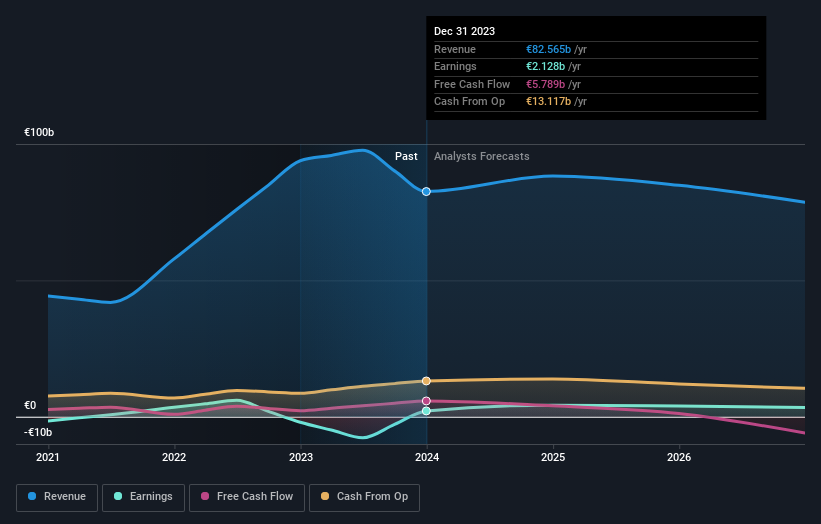- France
- /
- Other Utilities
- /
- ENXTPA:ENGI
Engie SA Earnings Missed Analyst Estimates: Here's What Analysts Are Forecasting Now
As you might know, Engie SA (EPA:ENGI) last week released its latest full-year, and things did not turn out so great for shareholders. It looks like quite a negative result overall, with both revenues and earnings falling well short of analyst predictions. Revenues of €83b missed by 15%, and statutory earnings per share of €0.87 fell short of forecasts by 61%. Earnings are an important time for investors, as they can track a company's performance, look at what the analysts are forecasting for next year, and see if there's been a change in sentiment towards the company. We've gathered the most recent statutory forecasts to see whether the analysts have changed their earnings models, following these results.
View our latest analysis for Engie

After the latest results, the 13 analysts covering Engie are now predicting revenues of €88.2b in 2024. If met, this would reflect an okay 6.9% improvement in revenue compared to the last 12 months. Statutory earnings per share are predicted to jump 103% to €1.78. Before this earnings report, the analysts had been forecasting revenues of €90.3b and earnings per share (EPS) of €1.78 in 2024. The consensus seems maybe a little more pessimistic, trimming their revenue forecasts after the latest results even though there was no change to its EPS estimates.
The consensus has reconfirmed its price target of €18.38, showing that the analysts don't expect weaker revenue expectations next year to have a material impact on Engie's market value. The consensus price target is just an average of individual analyst targets, so - it could be handy to see how wide the range of underlying estimates is. Currently, the most bullish analyst values Engie at €21.50 per share, while the most bearish prices it at €16.00. Still, with such a tight range of estimates, it suggeststhe analysts have a pretty good idea of what they think the company is worth.
Looking at the bigger picture now, one of the ways we can make sense of these forecasts is to see how they measure up against both past performance and industry growth estimates. We would highlight that Engie's revenue growth is expected to slow, with the forecast 6.9% annualised growth rate until the end of 2024 being well below the historical 13% p.a. growth over the last five years. Juxtapose this against the other companies in the industry with analyst coverage, which are forecast to grow their revenues (in aggregate) 0.3% per year. So it's pretty clear that, while Engie's revenue growth is expected to slow, it's still expected to grow faster than the industry itself.
The Bottom Line
The most important thing to take away is that there's been no major change in sentiment, with the analysts reconfirming that the business is performing in line with their previous earnings per share estimates. They also downgraded Engie's revenue estimates, but industry data suggests that it is expected to grow faster than the wider industry. Yet - earnings are more important to the intrinsic value of the business. The consensus price target held steady at €18.38, with the latest estimates not enough to have an impact on their price targets.
With that said, the long-term trajectory of the company's earnings is a lot more important than next year. We have forecasts for Engie going out to 2026, and you can see them free on our platform here.
It is also worth noting that we have found 3 warning signs for Engie that you need to take into consideration.
The New Payments ETF Is Live on NASDAQ:
Money is moving to real-time rails, and a newly listed ETF now gives investors direct exposure. Fast settlement. Institutional custody. Simple access.
Explore how this launch could reshape portfolios
Sponsored ContentValuation is complex, but we're here to simplify it.
Discover if Engie might be undervalued or overvalued with our detailed analysis, featuring fair value estimates, potential risks, dividends, insider trades, and its financial condition.
Access Free AnalysisHave feedback on this article? Concerned about the content? Get in touch with us directly. Alternatively, email editorial-team (at) simplywallst.com.
This article by Simply Wall St is general in nature. We provide commentary based on historical data and analyst forecasts only using an unbiased methodology and our articles are not intended to be financial advice. It does not constitute a recommendation to buy or sell any stock, and does not take account of your objectives, or your financial situation. We aim to bring you long-term focused analysis driven by fundamental data. Note that our analysis may not factor in the latest price-sensitive company announcements or qualitative material. Simply Wall St has no position in any stocks mentioned.
About ENXTPA:ENGI
Engie
Operates as an energy company, engages in the renewables and decentralized, low-carbon energy networks, and energy services businesses in France, Europe, North America, Asia, the Middle East, Oceania, South America, Africa, and internationally.
Average dividend payer and fair value.
Similar Companies
Market Insights
Weekly Picks

Early mover in a fast growing industry. Likely to experience share price volatility as they scale


A case for CA$31.80 (undiluted), aka 8,616% upside from CA$0.37 (an 86 bagger!).


Moderation and Stabilisation: HOLD: Fair Price based on a 4-year Cycle is $12.08
Recently Updated Narratives


Title: Market Sentiment Is Dead Wrong — Here's Why PSEC Deserves a Second Look


An amazing opportunity to potentially get a 100 bagger

Amazon: Why the World’s Biggest Platform Still Runs on Invisible Economics
Popular Narratives


Crazy Undervalued 42 Baggers Silver Play (Active & Running Mine)


MicroVision will explode future revenue by 380.37% with a vision towards success


NVDA: Expanding AI Demand Will Drive Major Data Center Investments Through 2026
Trending Discussion


